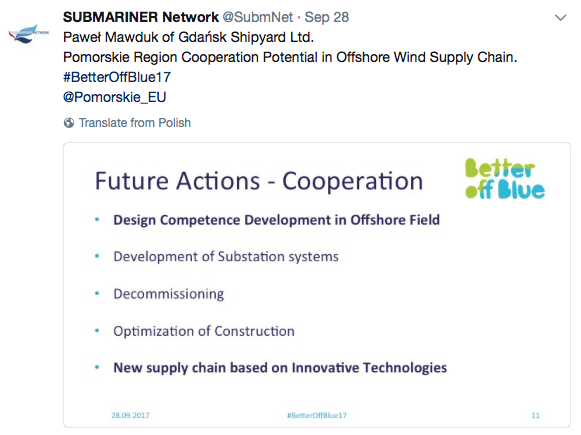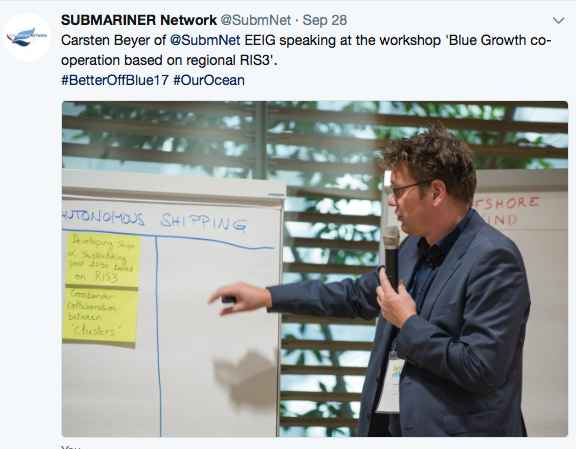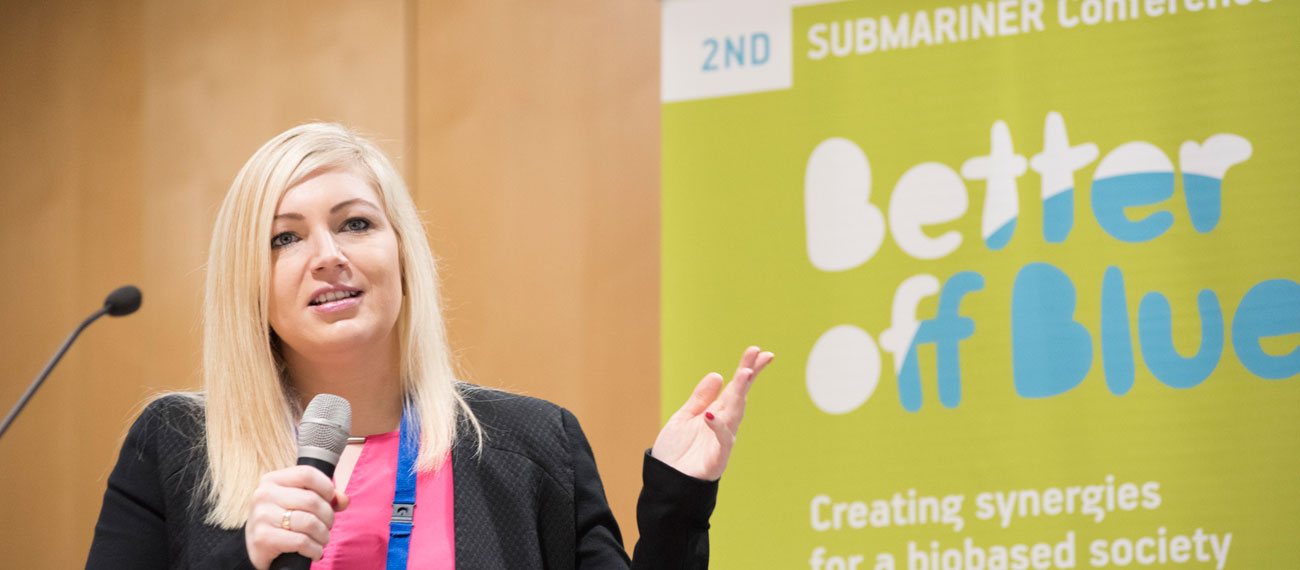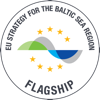Identifying Blue Growth cooperation opportunities between regions around the Baltic Sea based on their Smart Specialisation Strategies (RIS3) is an important aspect for the region’s blue economy. The aim of this workshop was to analyse the results of a BSR-wide study on smart specialisation developed under the Smart Blue Regions project (Baltic Sea Region Interreg Programme) and learn about the specific cooperation needs of the RIS3 actors in order to identify concrete Blue Growth cooperation areas between “blue” regions around the Baltic Sea.
After a brief presentation of the BSR-wide study result made by Barbara Weig (Ministry for Economy Schleswig-Holstein), the workshop focused on two cooperation topics: autonomous shipping / digitalisation of shipping and offshore wind.

Digitalised / autonomous shipping
The session dealing with autonomous shipping / digitalisation of shipping mainly focused on the region Skåne (Sweden) and Northern Germany. Participants discussed what the vision for shipping post-2030 should be in the Baltic Sea Region. In 2030, shipping should be sustainable, autonomous and have a maximised economic efficiency. The speakers, Karina Linnér (Linnér Consulting) and Wilko Bruhn ( Frauenhofer for Maritime Services and Logistics) also emphasised the importance of the triple helix collaboration in the area of autonomous shipping, i.e. the collaboration between regional and national administration, the academic sector and the business sector. As digitalisation of shipping is still at the research stage, the triple helix collaboration makes a lot of sense in the sector.
There is also a real need to identify the benefit of autonomous shipping and point out concrete use cases of it. For instance, autonomous ships could operate in the Baltic Sea in order to link an island with the continent.
The testing of autonomous ships in the Baltic Sea was also discussed. Because of its small size, its shallow water and its Nordic remote areas, the Baltic sea seems indeed to be perfectly adapted for such tests. A representative of Region Southwest Finland mentioned that Finland is quite advanced in this regard, as the country will open its first test field next year.
The lack of skilled workers in the maritime sector was also discussed during the workshop. Professional workers in more or less all trades and professions are needed. At the moment, this is especially obvious in the manufacturing part of the value chain. European manufacturing has gradually migrated to countries with lower labour costs, but besides needing to put more people in work in Europe, the cost-benefit balance of outsourcing is not that obvious anymore. But the reindustrialisation of Europe does not mean using economic templates from the 1950s. Nowadays we are talking about automation, digitalisation, robotisation, sustainability and the circular economy. Thousands of professionals are missing in the manufacturing today. Unless we prepare for proper education and training of the workforce for “industry 4.0”, Europe’s reindustrialisation will not happen. By 2030, workers in the maritime sectors and in the maritime value chains will still be needed and, additionally, persons with new IT qualifications will be a recruitment basis in order to run the autonomous vessels. IT engineers operating autonomous vessels won’t replace “Blue workers” working in the maritime field, but rather they will be complementary.
Offshore wind farms
Pawel Mawduk, representative from the Gdansk Shipyard (Region Pomorskie – Poland) explained that the objective of Poland is to have operational wind farms by 2022. For Pomorskie, cooperation with other Baltic states would be needed in the design and construction of offshore wind farms, the development of substation systems and in the decommissioning of offshore wind farms. Increasing Baltic cooperation in order to create a new “offshore wind farm supply chain” based on Innovative Technologies is also necessary.

Topics for further cooperation

One of the main objectives of this workshop was to create some matchmaking. Based on the discussions and collaboration needs mentioned during the workshop, additional seminars could be organised in order to deepen and develop cooperation ideas. The following potential seminars have been mentioned and workshop participants have been asked to indicate which potential seminar would be of interest for them:
-Developing ships and shipbuilding post 2030 based on RIS3 (value chain perspective)
-Create sustainable use cases (pilot, testing)
-Manufacturing processes in shipbuilding
-Cross boarder collaboration between “clusters”
-Pooling of complementary competences in triple helix structure
-Interface with other land transportation (multimodal transport)
-Navigation system (cyber security and implication for crew)
-Shore based supervision (test site in Finland)
-Lack of skilled workers (navigation, shipbuilding and port operators)
-New education possibilities / focus (higher education, professional training, competing globally for talents)
Regarding the offshore wind farms topic, cooperation seminars could be organised dealing with:
-optimisation of construction
-global training
-Decommissioning
Additionally, aquaculture could be a potential topic for future cooperation workshops. For instance, the combined use of aquaculture and offshore wind could be discussed.
Workshop's presentations:
Tags: Better off blue, Berlin, innovation, Southwest Finland, Gdansk, conference, SUBMARINER Network, associate members, RIS3, Smart Blue Regions, Interreg Baltic Sea Region, Baltic Sea Region, Germany, Schleswig-Holstein



